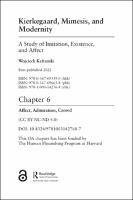Chapter 6 Affect, Admiration, Crowd
Proposal review
| dc.contributor.author | Kaftanski, Wojciech | |
| dc.date.accessioned | 2021-10-06T13:40:35Z | |
| dc.date.available | 2021-10-06T13:40:35Z | |
| dc.date.issued | 2021 | |
| dc.identifier.uri | https://library.oapen.org/handle/20.500.12657/50846 | |
| dc.description.abstract | “Chapter 6” systematizes and analyzes Kierkegaard’s insightful remarks on human affectivity in relation to moral emotions, body, contagion, and collectivity. Following a brief outline of the conceptualization of affects and human affectivity from Plato, Aristotle, Descartes, Spinoza, Tomkins, and Massumi, the first part zooms in on empathy and sympathy in two important precursors of Kierkegaard, namely David Hume and Adam Smith. The second part argues for Kierkegaard’s distinctively affective reading of admiration, which I locate in its being fundamentally linked with other emotions such as envy, but also in its being oriented toward the mediocre and base, having a limited motivational capacity, and being highly contagious. Affective admiration is then related to the contemporary discussion on moral exemplars, posing a challenge to the view of the epistemological and moral trustworthiness of admiration in moral exemplarity espoused primarily by Linda Zagzebski. The third part centers on the affective character of Kierkegaard’s crowd psychology. Therein I examine his critical remarks on human collectivity, focusing on such key concepts from his social and political philosophy as “crowd” and “the public.” Reading his philosophy alongside two French theorists of mass society, Gabriel Tarde and René Girard, I draw out Kierkegaard’s great interest in such mimetic terms as magnetism, fascination, somnambulism, scapegoating, and violence. | en_US |
| dc.language | English | en_US |
| dc.subject.classification | thema EDItEUR::Q Philosophy and Religion::QD Philosophy | en_US |
| dc.subject.classification | thema EDItEUR::Q Philosophy and Religion::QD Philosophy::QDH Philosophical traditions and schools of thought::QDHR Western philosophy from c 1800 | en_US |
| dc.subject.classification | thema EDItEUR::Q Philosophy and Religion::QR Religion and beliefs::QRA Religion: general::QRAB Philosophy of religion | en_US |
| dc.subject.other | Philosophy, Kierkegaard, 19th century philosophy, history of philosophy, aesthetics, religion and philosophy | en_US |
| dc.title | Chapter 6 Affect, Admiration, Crowd | en_US |
| dc.type | chapter | |
| oapen.identifier.doi | 10.4324/9781003142768-7 | en_US |
| oapen.relation.isPublishedBy | 7b3c7b10-5b1e-40b3-860e-c6dd5197f0bb | en_US |
| oapen.relation.isPartOfBook | 71b2ed40-dba2-436b-a6c3-f73ccd0ff08c | en_US |
| oapen.relation.isbn | 9780367695590 | en_US |
| oapen.relation.isbn | 9780367696658 | en_US |
| oapen.imprint | Routledge | en_US |
| oapen.pages | 40 | en_US |
| oapen.remark.public | Funder name: The Human Flourishing Program at Harvard | |
| peerreview.anonymity | Single-anonymised | |
| peerreview.id | bc80075c-96cc-4740-a9f3-a234bc2598f1 | |
| peerreview.open.review | No | |
| peerreview.publish.responsibility | Publisher | |
| peerreview.review.stage | Pre-publication | |
| peerreview.review.type | Proposal | |
| peerreview.reviewer.type | Internal editor | |
| peerreview.reviewer.type | External peer reviewer | |
| peerreview.title | Proposal review | |
| oapen.review.comments | Taylor & Francis open access titles are reviewed as a minimum at proposal stage by at least two external peer reviewers and an internal editor (additional reviews may be sought and additional content reviewed as required). |

